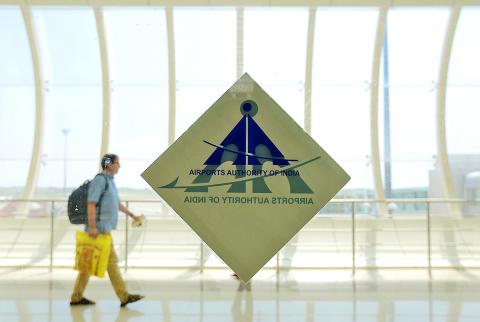Whether you regard your next flight as a chance to kick back and relax or a valuable window to catch up on lost work may depend on where you live, according to a survey of 8,000 passengers in 10 key travel markets.
While airlines seem determined to keep passengers connected 24-7, most people from France, Germany, Japan, Sweden, Britain and the US are happy to have their phones rendered unusable while en route, the poll suggests. Indian, Chinese and Arab passengers, by contrast, are generally keen to make calls.
STAYING CONNECTED?

Photo: Reuters
Some 69 percent of Germans reckon it’s not necessary to be permanently available, compared to just 12 percent of Indians and 18 percent of Chinese, according to the survey. The risk of disturbance was cited as the chief concern surrounding inflight phone links, with Japanese travelers most worried. Many Asian flyers said they’d pay for connectivity even if the flight cost much more.
While Eastern passengers may be keen to work — or chat — they’re also most concerned about the contents of refresher packs handed out by airlines.
Travelers from the United Arab Emirates, China and India said having a toothbrush and eye mask was important or very important, compared with only 38 percent of Swedes. Fewer than one-third of respondents in any country wanted a shower, spa, wellness service or fitness equipment on board.
BIGGER SEATING
Generously sized seating is regarded as a priority on long-haul flights, especially for Americans, with 59 percent of US respondents ranking bottom space and legroom as very important. Better seating is also the single-biggest priority for people when considering the future of air travel, the poll suggests.
Among other findings the survey by Nielsen suggests: The British are the most likely to be bothered about waiting in line at the airport check-in; Swedes are the most chilled.
Having a range of inflight films, music and audio-books on offer matters most to customers from the US, India and the UAE. Japanese flyers are the least keen on hearing updates from the pilot, whereas people from India and South Africa lap up progress reports.
Fast, free Internet access is globally desirable but especially popular in China, South Africa and the US.
The survey was commissioned for Turkish Airlines’ annual Global Aviation Trends report.

In the March 9 edition of the Taipei Times a piece by Ninon Godefroy ran with the headine “The quiet, gentle rhythm of Taiwan.” It started with the line “Taiwan is a small, humble place. There is no Eiffel Tower, no pyramids — no singular attraction that draws the world’s attention.” I laughed out loud at that. This was out of no disrespect for the author or the piece, which made some interesting analogies and good points about how both Din Tai Fung’s and Taiwan Semiconductor Manufacturing Co’s (TSMC, 台積電) meticulous attention to detail and quality are not quite up to

April 21 to April 27 Hsieh Er’s (謝娥) political fortunes were rising fast after she got out of jail and joined the Chinese Nationalist Party (KMT) in December 1945. Not only did she hold key positions in various committees, she was elected the only woman on the Taipei City Council and headed to Nanjing in 1946 as the sole Taiwanese female representative to the National Constituent Assembly. With the support of first lady Soong May-ling (宋美齡), she started the Taipei Women’s Association and Taiwan Provincial Women’s Association, where she

Chinese Nationalist Party (KMT) Chairman Eric Chu (朱立倫) hatched a bold plan to charge forward and seize the initiative when he held a protest in front of the Taipei City Prosecutors’ Office. Though risky, because illegal, its success would help tackle at least six problems facing both himself and the KMT. What he did not see coming was Taipei Mayor Chiang Wan-an (將萬安) tripping him up out of the gate. In spite of Chu being the most consequential and successful KMT chairman since the early 2010s — arguably saving the party from financial ruin and restoring its electoral viability —

It is one of the more remarkable facts of Taiwan history that it was never occupied or claimed by any of the numerous kingdoms of southern China — Han or otherwise — that lay just across the water from it. None of their brilliant ministers ever discovered that Taiwan was a “core interest” of the state whose annexation was “inevitable.” As Paul Kua notes in an excellent monograph laying out how the Portuguese gave Taiwan the name “Formosa,” the first Europeans to express an interest in occupying Taiwan were the Spanish. Tonio Andrade in his seminal work, How Taiwan Became Chinese,